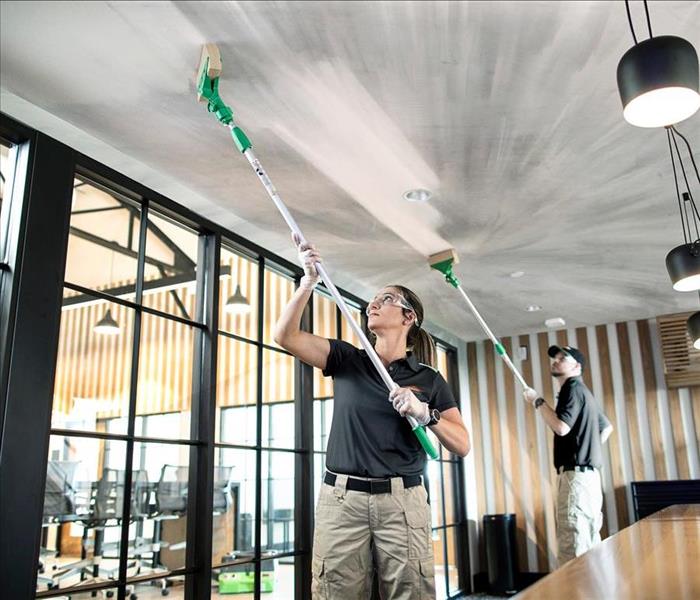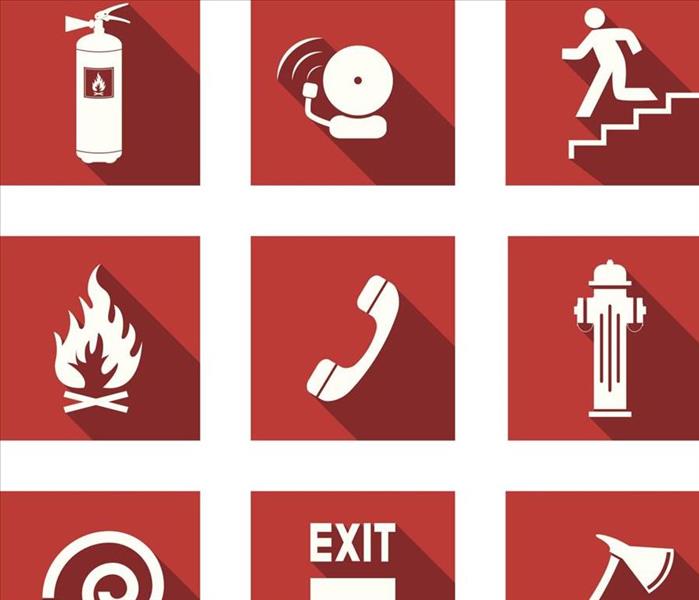Archived Fire Damage Blog Posts
How to Properly Install and Maintain Smoke Detectors
10/3/2023 (Permalink)
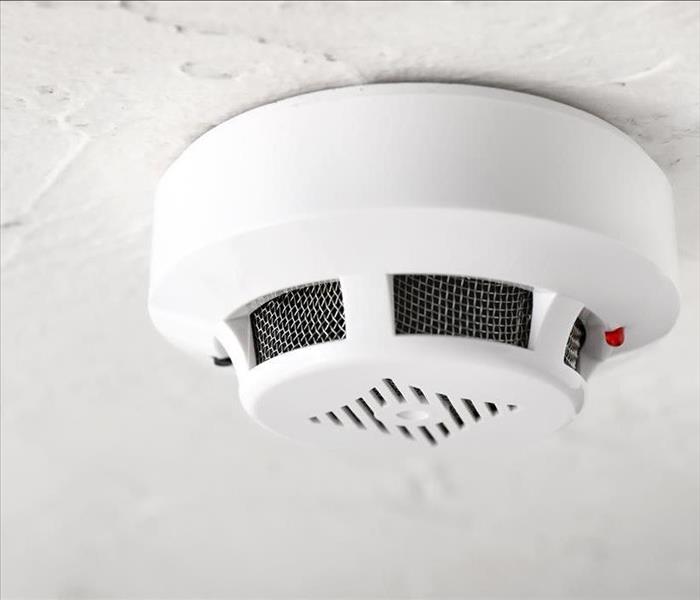 Maintaining a properly functioning smoke detector will not only keep peace and quiet in your home, but will make it much safer.
Maintaining a properly functioning smoke detector will not only keep peace and quiet in your home, but will make it much safer.
How to Properly Install and Maintain Smoke Detectors
We have all had that frustrating experience with a faulty smoke detector that just will not stop beeping. Maintaining a properly functioning smoke detector will not only keep peace and quiet in your home, but will make it much safer.
Tips for properly installing smoke detectors:
- The number of smoke detectors necessary for your home will be determined by the size and layout of your home. However, as a general rule you should have at least one on every level of your home (including the basement) and one in every bedroom.
- Install smoke detectors in central locations. Ceiling detectors should be placed on a flat area and wall detectors must be less than 12 inches from the ceiling.
- Always follow your device’s instructions carefully while installing (especially detectors that require hardwired power). If you do not feel comfortable installing on your own, there are many professional services that will install them for you.
- Test your alarm after installing them by using the test button
Tips for maintaining smoke detectors:
- Never use the same smoke detector for longer than 10 years. If you have had the same ones for longer than this, replace them as soon as possible.
- Test the alarms monthly.
- Replace non-hardwired detector’s batteries annually.
- Clean your detectors every year. Dust and other pollutants can impede the performance of your smoke detectors.
If you experience a fire loss in your home, SERVPRO® of Saline County and Hot Springs is here to help 24/7. Our team of fire restoration professionals will restore your home to preloss conditions, so it is "Like it never even happened." Call us at (501) 776-2222.
The Leading Cause of Housefires in Saline County
7/10/2023 (Permalink)
Most Fire Damage in Saline County is caused by Everyday Household Accidents.
When you think of the common causes of house fires, you may imagine extraordinary situations causing widespread damage. In reality, however, residential fires are most often caused by everyday household accidents.
SERVPRO of Saline County and Hot Springs is a leading expert in fire and smoke damage restoration and has effectively dealt with fire and smoke damage of all kinds and severity levels. Based on our experience, most house fires are not caused by unique events such lightning strikes, wildfires, or arson. Most commonly, fires in the home result from fairly common accidents, such as unattended cooking or improperly extinguishing a grease fire.
Common accidents that may lead to fire and smoke damage:
- Forgetting to turn off cooking appliances and electronic devices (Clothing irons, ovens or ranges, hair styling tools, etc.)
- Out of control grease fires that occur while cooking
- Falling asleep on a couch or in your bed with a lit cigarette
- Electrical shorts or exposed wiring
- Overheating halogen lamps and other light sources
- Children playing with appliances, electrical devices, lighters, or matches
- Unattended candles or other open flames
When remediating fire-damaged homes, clean-up and fire restoration technicians usually determine that one or more of these situations has caused the blaze.
With that in mind, if your home has experienced a fire and you need help cleaning up the damage, call our team at SERVPRO of Saline County and Hot Springs. Our skilled and well-equipped professionals are ready for your call 24/7 at (501) 409-6557.
Before You Visit a Saline County Firework Stand
6/20/2022 (Permalink)
 Celebrate responsibly on the Fourth of July!
Celebrate responsibly on the Fourth of July!
Tis the season for those little roadside tents to pop up along the landscape. You know the ones. You'll see more and more fireworks stands as the calendar edges closer to the Fourth of July. This is the year you're going BIG.
Well, maybe not so fast.
There are some key safety measures to keep in mind before you light that first fuse! The goal is to have fun, and if safety isn't a priority, your celebration could end with something burning other than the fuse or worse, a surprise trip to the emergency room.
First, familiarize yourself with the state laws pertaining to fireworks in your area, wherever you may celebrate. Arkansas only permits certain types of firework purchases during specific times of the year, and only to those 12 years old and older.
Secondly, keep yourself safe! Make sure to never lean over the fuse when lighting it and keep a garden hose or water bucket nearby as a safety precaution. It's extremely tempting to try and re-light a "dud" firework, but don't do it! It could explode and burn you. Did you know that 44% of firework injuries were due to burns? That's an important percentage to remember, especially when it comes to children. Many people see sparklers as harmless, but a lit sparkler burns at around 2000 degrees. Half of the total firework injuries to young children involved sparklers. Please choose a safer alternative like a glow stick or streamer for your child.
When it comes to fireworks, don't forget about your furry friends. Dogs are extremely sensitive to loud noises and flashing lights. Walk them earlier in the day and leave them indoors when fireworks are in use. Close the curtains and make them a comfortable spot with music or a television playing to distract from the loud noises outside.
With a little consideration and the proper safety precautions, fireworks can be a lot of fun. No matter how you celebrate, do it safely! Have a Happy Independence Day from your friends at SERVPRO of Saline County and SERVPRO of Hot Springs!
Let's Talk About Smoke Alarms
5/27/2022 (Permalink)
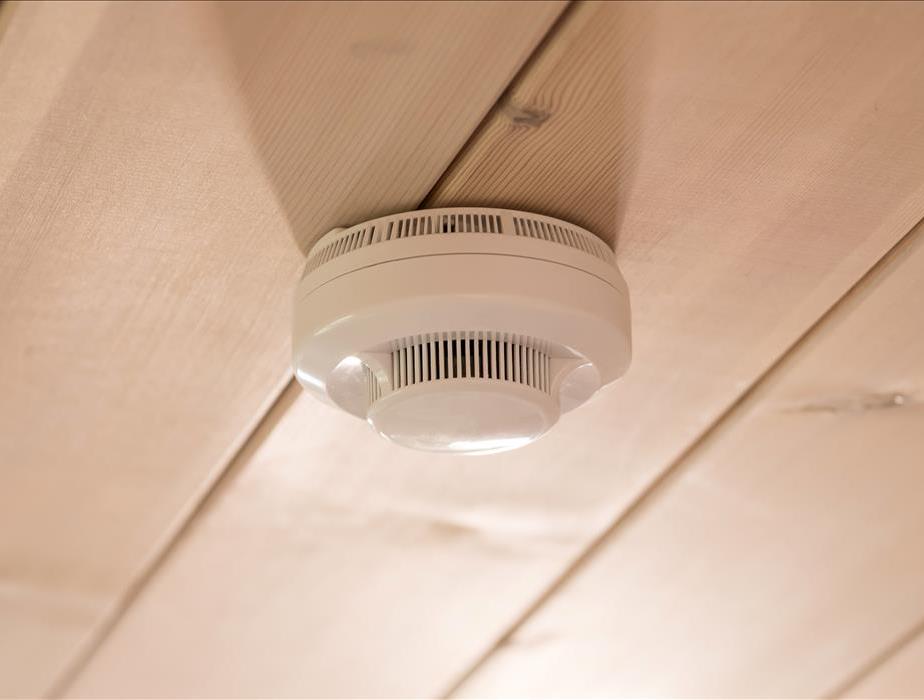 Smoke alarms can be a lifesaver.
Smoke alarms can be a lifesaver.
You probably know how important it is to have at least one smoke alarm in your Benton, AR home.
Yet you may have many questions about purchasing and maintaining your detectors. Below are answers to some common queries.
What Types of Smoke Detectors Should You Buy?
There are three main types of smoke detectors. They are:
- Photoelectric
- Ionization
- Dual sensor
Photoelectric and ionization alarms each sense different types of fires. Dual-sensor detectors, meanwhile, include both ionization and photoelectric sensors. Ideally, you should place either one dual-sensor alarm or both photoelectric and ionization alarms near every bedroom in your home.
Make sure that the detectors are connected. This way, they will all go off at the same time. There are also special alarms available for those who are hearing impaired.
How Much Do Smoke Alarms Cost?
A smoke alarm is a cheap way to keep your family safe. Photoelectric and ionization detectors cost as little as six dollars. Dual-sensor alarms, meanwhile, are just $24. Your local fire department may even provide free or low-cost detectors for your home.
How Do You Maintain Smoke Detectors?
You need to regularly check each smoke detector in your home to see if it is functioning properly. Ideally, you should test the alarms each month.
Alarms that are hardwired into your home or that rely on a nine-volt battery should be replaced every 10 years. You should also change the batteries at least once a year.
Some smoke detectors now come with a 10-year lithium battery. Check the manufacturer's instructions to see how often you should replace these alarms.
Of course, a smoke alarm does not always prevent home fires. It simply tells you when a blaze is occurring so you can escape your house safely. Therefore, even if you install numerous detectors, your property could still sustain fire damage. That is why local emergency restoration specialists are available to assist with the cleanup.
Kitchen Safety for Your Alexander, AR Home
4/22/2022 (Permalink)
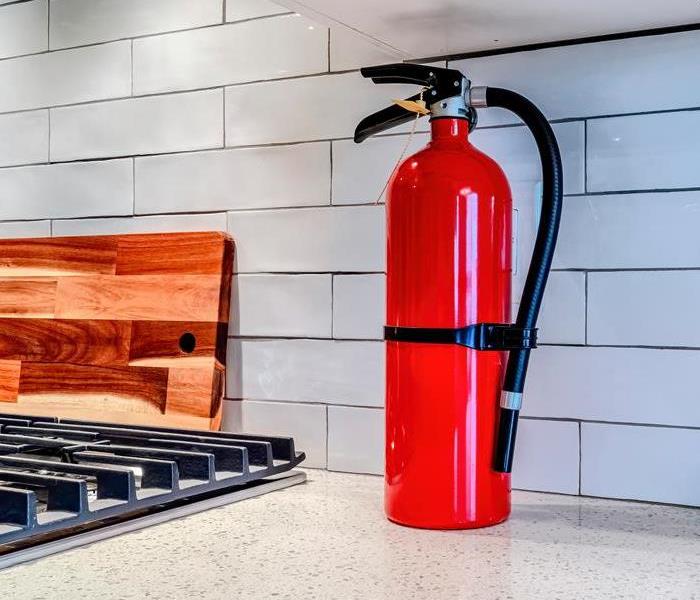 A fire extinguisher is good in a pinch, but follow proper kitchen safety to prevent grease fires.
A fire extinguisher is good in a pinch, but follow proper kitchen safety to prevent grease fires.
People have been getting more and more creative in the kitchen over the past two years. The pandemic kept everyone home for most of 2020 and 2021. Restrictions relaxed quite a bit in 2022, so people were excited to get out of their homes and head to restaurants. Then came unprecedented inflation. Prices shot through the roof on basically everything, so a lot of people had to forego the luxury of dining out. There's a pretty good chance that home cooks throughout the South are going to fry something on the stove more than once. Give us our comfort food and understand that's just how it goes in Arkansas!
So, let's revisit some basic kitchen safety tips to keep the good food coming with none of the nasty grease fires!
Kitchen Safety 101
Always give your full attention to cooking. It's sometimes difficult to do when family members are home and everything is hectic, but it is essential. Forty-nine percent of home fires begin with cooking equipment, and thirty-three percent of those are from unattended equipment! A moment's distraction could end in tragedy.
A grease fire is the most common type of kitchen fire. Smoking oil is a sign that your burner is too hot! Should a fire develop, turn off the heat immediately! When frying on the stovetop, always have a lid nearby to suffocate a fire. It is also important to keep a large box of baking soda on-hand to put out a small grease fire. Never pour water on a grease fire – it will only make it worse! Every kitchen should have a fire extinguisher as a last resort.
Once you've finished cooking, always clean up any grease splatter on and around the stove. Thoroughly clean the heating elements or glass top so remnants cannot catch fire the next time the stove is in use.
Cooking is a fun and relaxing activity, but sometimes things do go wrong. Should your kitchen become damaged from a fire or water, give us a call! SERVPRO of Saline County and SERVPRO of Hot Springs are available 24/7 at 501-776-2222. Call in the professionals and we'll make it “Like it never even happened.”
We're always here to help.
Fire Up the Grill in Hot Springs, AR!
4/1/2022 (Permalink)
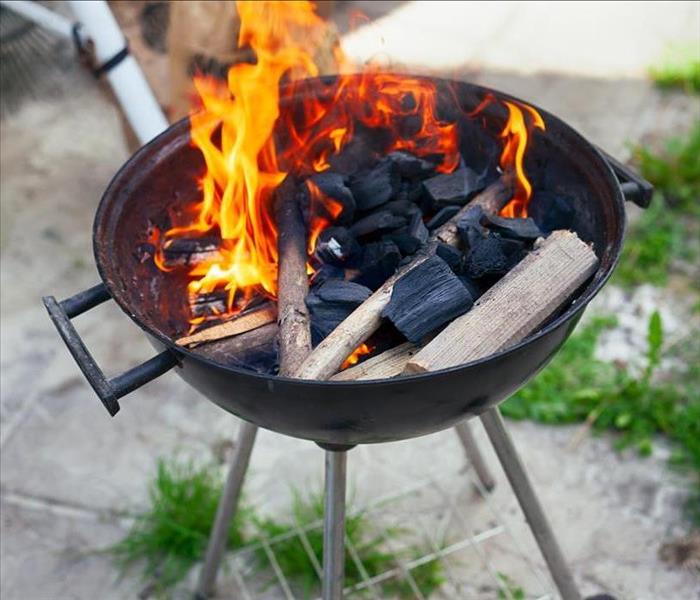 Make sure the fire stays in the grill!
Make sure the fire stays in the grill!
Signs of Spring are finally upon us, and it's time to break out the grill! According to the Hearth, Patio & Barbecue Association, 64% of US adults own a grill or smoker – that's almost two-thirds of the population! The massive popularity of outdoor cooking can end badly if proper safety precautions are not observed. So, let's run through a few safety tips to make your cookout a success!
Sure, you know your grill, but how well do you really know your grill? Keep a copy of your manual if possible; alternately, it should be available on the manufacturer's website. Become familiar with your specific model, as features and functions are not the same on every grill.
Location is important! A grill should only be set up on a flat surface so it cannot tip over. Protect your deck or patio with a grill pad or splatter mat underneath. Check your manual for the minimum keep-clear distance required for your grill. If you're using a gas grill, make sure to check for a propane leak before the first BBQ of the season. Just apply a light soap and water solution to the hose, then turn on the gas. If you see any bubbling, you've got a leak that needs to be fixed before going any further!
Keep it clean! Always make sure to clean the grease off the grill before using it again. Make sure to have baking soda on hand in case of a grease fire. Should the flame go out, turn off the grill and the gas and give it at least five minutes before re-lighting it.
Charcoal grills cause more fires than gas grills, so always proceed with caution. Allow the coals to cool completely before disposing of them in a metal container.
We know that cookouts usually aren't complete without a few adult beverages of choice, but if you're in charge of the fire, keep it in check to avoid carelessness!
All of us at SERVPRO of Saline County and SERVPRO of Hot Springs love a great burger from the grill, but we know that accidents sometimes happen. We're always here to help. Find us at 501-776-2222.
We'll make it “Like it never even happened.”
Spontaneous Combustion is Real
3/9/2022 (Permalink)
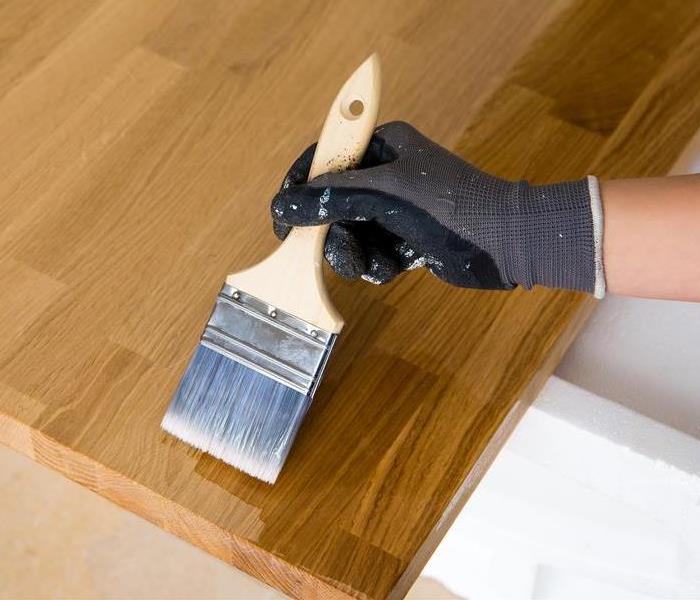 Once you wipe off the excess oil, dispose of the oily rag properly!
Once you wipe off the excess oil, dispose of the oily rag properly!
All fires start somewhere. It is generally accepted that fires start once something sparks. No spark, no flame.
Not always.
Let's talk about spontaneous combustion. It's actually not a myth! Fires that start without a spark are more common than most people realize. Oxidation is a chemical reaction where certain materials mix with the surrounding air and slowly release heat. Should the temperature get high enough, it ignites. This can happen in a variety of materials, but the major culprit of spontaneous home fires is often oily rags.
Rags can get oily for a variety of reasons. Cleaning the garage floor after accidentally knocking over the gasoline can? Spill cooking oil in the kitchen? Wiping off the excess after sealing your new deck? Once you finish your cleanup or project, it is extremely important to properly store the rags for cleaning or disposal.
Never, ever leave the rags in a pile.
When this happens, the heat fails to dissipate from the lack of air circulation. The rags may begin to smoke and eventually burst into flames. Left unattended, it's a disaster in the making.
So, what's the solution?
There are a couple methods of storing or disposing of oily rags that greatly reduce the risk of spontaneous combustion. Throwing them in the washing machine, then tossing them in the dryer is not one of them. One option allows the rags to air dry. Make sure the area is out of the sunlight, otherwise the rays could accelerate the process! Lay the rags flat and in one layer on concrete or bare soil. Leave them there for two days until they feel dry and the oil smell lessens. Check with your garbage service for hazardous waste disposal. Another disposal option is to place the rags in an old paint can, then adding enough water to completely submerge them. Use a stone to hold the rags in the water. Finally, seal the lid back onto the can and arrange for a pickup from your garbage service.
Spontaneous combustion fires are more common than you think. Keep yourself and your family safe by properly disposing of oily rags.
Should you need fire and water mitigation as the result of a chemical reaction fire, SERVPRO of Saline County and SERVPRO of Hot Springs are always here to help make it "Like it never even happened."
Watch Your Butts
2/15/2022 (Permalink)
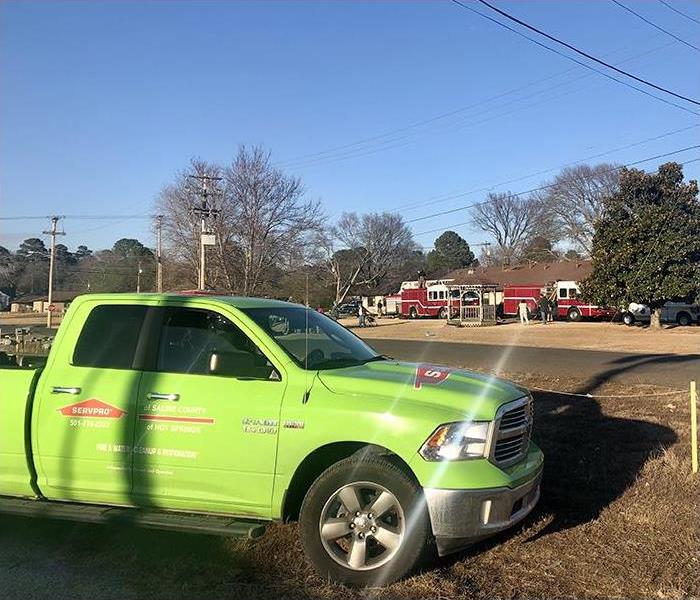 Watch your butts and dispose of cigarettes properly.
Watch your butts and dispose of cigarettes properly.
Smoking is dangerous for a number of reasons, but not all of them involve your lungs. Your habit could have devastating effects on the people around you, even if that was never your intention.
How many times have you noticed someone smoking while walking to the entrance of a business or apartment complex in Benton, AR? Right before the person enters the building, they flick their cigarette butt down onto the parking lot or sidewalk without a further thought. Sometimes a cigarette butt lands In a grassy area or on top of something else flammable. This moment of careless littering could have tragic consequences.
It only takes a moment for dry grass to ignite near the entrance of a building. Fire is opportunistic and rapidly spreads, meaning it could engulf a multi-unit residence before everyone has a chance to escape. Stop the carelessness. Make sure cigarette butts are completely extinguished and make sure to always dispose of them in the proper receptacles.
The home you save could be your own.
SERVPRO of Saline County and SERVPRO of Hot Springs are ready to mobilize and board up your home or business in the unfortunate event of a fire. Save our number in your phone in case you ever need us: 501-776-2222.
We're always here to help.
National Fire Prevention Week 2021
10/4/2021 (Permalink)
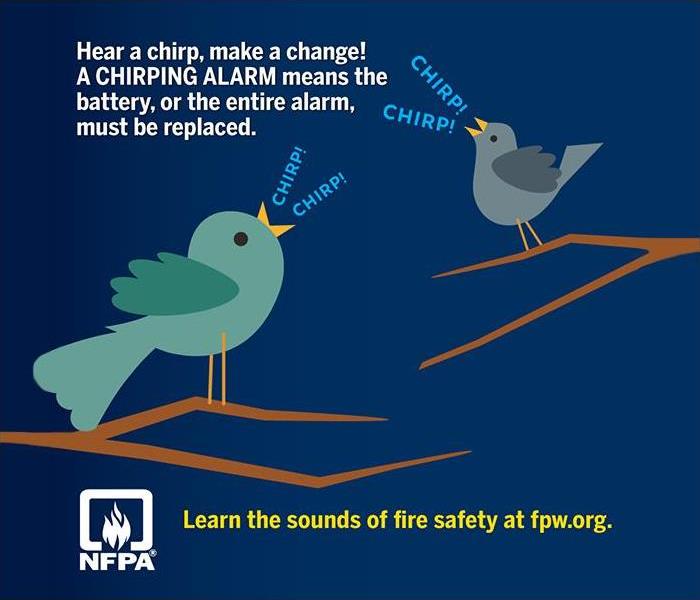 Don't ignore a chirping smoke detector!
Don't ignore a chirping smoke detector!
National Fire Prevention Week is the longest-running public health observance in the United States, originating after a 1925 proclamation from then-President Calvin Coolidge. Observed annually in the week in which October 9th falls, it serves as a week of fire safety education for children, teachers, and adults in order to decrease casualties associated with fires. The devastating Chicago Fire of 1871 was the impetus for increased public fire safety education after 250 people perished and 100,000 were left homeless.
National Fire Prevention Week features a yearly theme, designed to draw attention to a particular aspect of fire awareness and education. The 2021 theme is "Learn the Sounds of Fire Safety."
While many people are likely familiar with a smoke alarm that periodically chirps once to signal a low battery, any noise from a smoke detector should not be tuned out or ignored. Smoke detectors are a crucial element in fire safety, so strong batteries and regular maintenance are a must. A chirping smoke detector doesn't necessarily mean the battery is low. The life cycle of a smoke detector is 10 years. It's a great idea to label the date the smoke detector was installed and the date of the last battery change so you can keep track and make sure you're up to date!
A smoke detector is invaluable, but what if you or someone in your household Is deaf or hard of hearing? There's a solution! Different types of alert systems are available that function like smoke detectors. There are pillow or bed shakers and strobe lights designed to alert someone who is unable to hear a traditional smoke detector. It is important to make sure these devices have been lab-tested.
Find out more about National Fire Prevention Week at their website: http://www.firepreventionweek.org/
Firework Safety is Essential
7/1/2021 (Permalink)
 Fireworks are a fun tradition, but make sure you follow state laws and safety precautions.
Fireworks are a fun tradition, but make sure you follow state laws and safety precautions.
Tis the season for those little roadside tents to pop up along the landscape. You know the ones. You'll see more and more fireworks stands as the calendar edges closer to the Fourth of July. Admittedly, there is a lot to celebrate this year, with the country making strides in its return to normal. So maybe you're thinking of going big this year, just to release all the pent-up frustration of essentially losing almost a year and a half of fun and celebration due to the pandemic?
Well, maybe not so fast.
There are some key safety measures to keep in mind before you light that first fuse! The goal is to have fun, and if safety isn't a priority, your celebration could end with something burning other than the fuse or worse, a surprise trip to the emergency room.
First, familiarize yourself with the state laws pertaining to fireworks in your area, wherever you may celebrate. Arkansas only permits certain types of firework purchases during specific times of the year, and only to those 12 years old and older.
Secondly, keep yourself safe! Make sure to never lean over the fuse when lighting it and keep a garden hose or water bucket nearby as a safety precaution. It's extremely tempting to try and re-light a "dud" firework, but don't do it! It could explode and burn you. Did you know that 44% of firework injuries were due to burns? That's an important percentage to remember, especially when it comes to children. Many people see sparklers as harmless, but a lit sparkler burns at around 2000 degrees. Half of the total firework injuries to young children involved sparklers. Please choose a safer alternative like a glow stick or streamer for your child.
When it comes to fireworks, don't forget about your furry friends. Dogs are extremely sensitive to loud noises and flashing lights. Walk them earlier in the day and leave them indoors when fireworks are in use. Close the curtains and make them a comfortable spot with music or a television playing to distract from the loud noises outside.
With a little consideration and the proper safety precautions, fireworks can be a lot of fun. However you celebrate, do it safely! Happy Independence Day from your friends at SERVPRO of Saline County and SERVPRO of Hot Springs!
We Offer Board-Up Services for Your Fire Loss
6/1/2021 (Permalink)
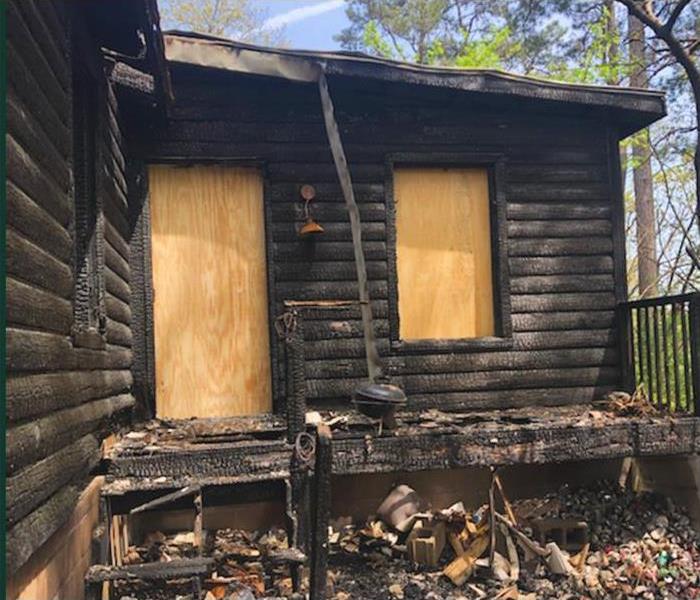 Keep your home secure after a loss with our Board-Up Services. Call today to find out more.
Keep your home secure after a loss with our Board-Up Services. Call today to find out more.
A fire is one of the most traumatizing, intensely personal types of loss to happen to a person. Once the flames are extinguished and the remains stop smoldering, the structure itself is left vulnerable and open to would-be thieves. You've already lost enough of your belongings in the fire -- you don't want anything else to happen. Let us help you with that.
SERVPRO of Saline County and SERVPRO of Hot Springs are pleased to offer board-up services after a fire loss. The openings where your doors and windows used to be will be securely boarded up with plywood to block entrance from any would-be looters. It can bring some peace of mind to an already stressful situation.
Add us to your phone contacts today: SERVRPRO of Saline County and SERVPRO of Hot Springs - 501-776-2222. Should you suffer a loss, call us, and we'll be there for you. We're always here to help.
Preventing Electrical Fires
4/26/2021 (Permalink)
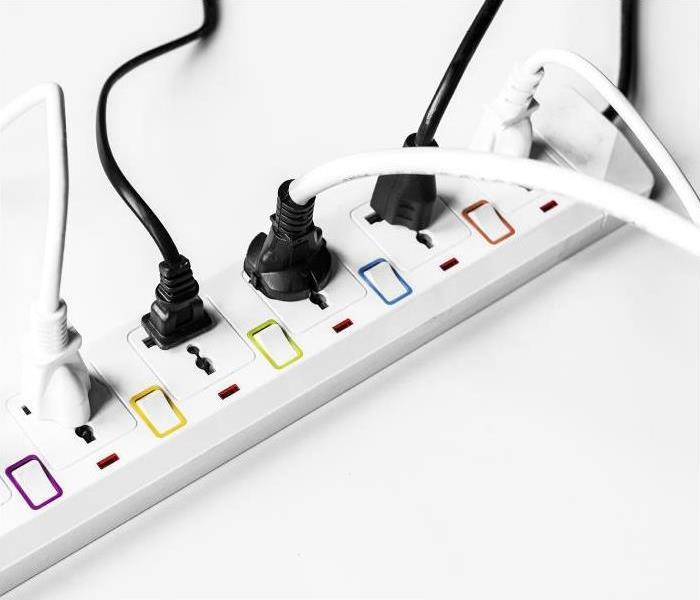 Unplug heat-producing devices when you aren't using them
Unplug heat-producing devices when you aren't using them
An electrical fire in the home is often unpredictable, which makes it one of the more dangerous kinds of house fires. Fires caused by faulty wiring often happen in the middle of the night, which can quickly lead to a tragic situation if the home doesn't have functional smoke alarms. Electrical fires represent 10% of home fires, but sadly, are responsible for 19% of home fire deaths. While faulty wiring inside the home needs to be repaired by a professional, other types of electrical fires occur in the home as well. These can be prevented with a little maintenance and by keeping some tips top-of-mind while using the electrical items.
Extension cords can be useful but think of them as a temporary solution to a problem. Before using an electrical cord, check for any damage, and if there is any, don't use it! Also, remember to never overload an extension cord because you could quite literally be playing with fire.
It's also a good idea to only plug in appliances that generate heat when you need to use them. This includes household items like toasters, irons, hairdryers, curling irons, and hair straighteners. Should one of these devices malfunction and heat up unexpectedly, it could cause a fire.
Sometimes, trouble lets you know that it's on the way. Don't ignore it. Should you see burn marks around a light, this could become an issue. Have you noticed a cord that feels hot to the touch when it wasn't like that before? Stop using it. Has a device started sparking when you plug it into the outlet? Take it as the huge sign that it is that something is wrong and the item should either be repaired or tossed. If the problem is at the outlet, consult an electrician.
Keeping fire safety at the top of mind when you use the electrical appliances in your home goes a long way to keep a fire from happening.
Though should the unexpected happen and you experience a fire loss in your home, we're always here to help. Give the professionals at SERVPRO of Saline County and SERVPRO of Hot Springs a call at 501-776-2222. Available 24/7, we're always here to help. We'll make it "Like it never even happened."
BBQ Season is Here!
4/2/2021 (Permalink)
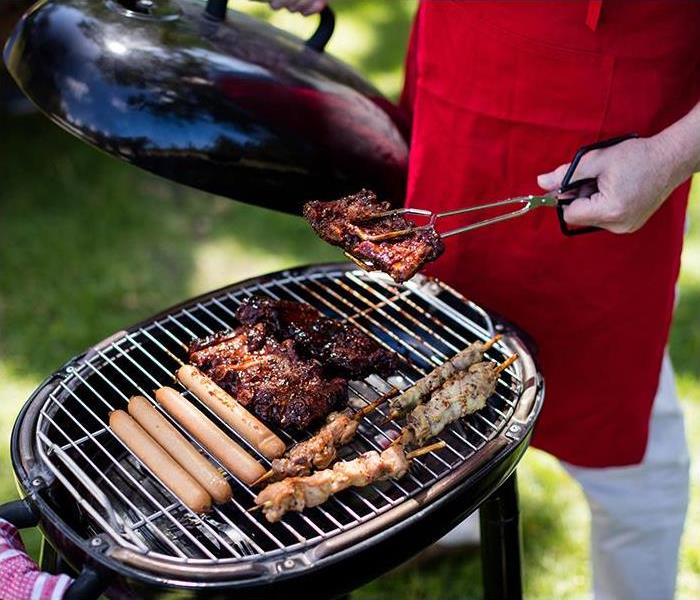 Follow these tips for a safe and fun BBQ
Follow these tips for a safe and fun BBQ
The days are getting longer and the temperatures are rising. Signs of Spring are upon us, and Americans are itching to partake in one of their favorite pastimes: the cookout! According to the Hearth, Patio & Barbecue Association, 64% of US adults own a grill or smoker – that's almost two-thirds of the population! The massive popularity of outdoor cooking can end badly if proper safety precautions are not observed. So let's run through a few safety tips to make your cookout a success!
Sure, you know your grill, but how well do you really know your grill? Keep a copy of your manual if possible; alternately, it should be available on the manufacturer's website. . Become familiar with your specific model, as features and functions are not the same on every grill.
Location is important! A grill should only be set up on a flat surface so it cannot tip over. Protect your deck or patio with a grill pad or splatter mat underneath. Check your manual for the minimum keep-clear distance required for your grill. If you're using a gas grill, make sure to check for a propane leak before the first BBQ of the season. Just apply a light soap and water solution to the hose, then turn on the gas. If you see any bubbling, you've got a leak that needs to be fixed before going any further!
Keep it clean! Always make sure to clean the grease off the grill before using it again. Make sure to have baking soda on hand in case of a grease fire. Should the flame go out, turn off the grill and the gas and give it at least five minutes before re-lighting it.
Charcoal grills cause more fires than gas grills, so always proceed with caution. Allow the coals to cool completely before disposing of them in a metal container.
We know that cookouts usually aren't complete without a few adult beverages of choice, but if you're in charge of the fire, keep it in check to avoid carelessness!
All of us at SERVPRO of Saline County and SERVPRO of Hot Springs love a good cookout, but we know that accidents sometimes happen. We're always here to help. Give us a call at 501-776-2222. Fire & Water – Cleanup & Restoration. We'll make it “Like it never even happened.”
Fire Safety for Your Saline County Church
3/10/2021 (Permalink)
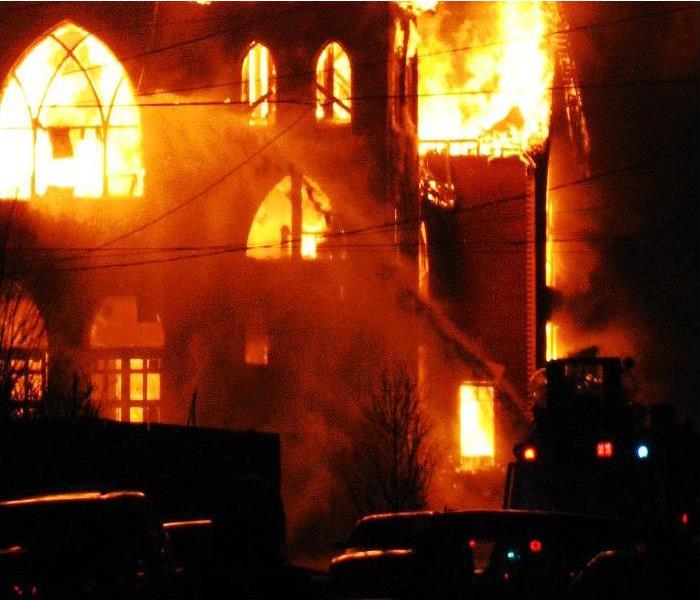 Church fires often result in a total loss.
Church fires often result in a total loss.
A church holds a special place in the hearts of its parishioners. Often, communities come together as one to erect a new place of worship for the residents. Once the church is built, it is especially important to understand that contributing factors could lead to the new church becoming susceptible to fire. Donated labor, while appreciated, could often unintentionally overlook important safety guidelines required for construction.
There is an average of three church fires per day in the United States. While the number is relatively small in regards to the thousands of American churches, a church fire often causes tens of thousands of dollars in damages, resulting in the church being declared a total loss. Almost 35% of these church fires can be attributed to defective furnaces and stoves. The second leading cause of church fires is a result of defective wiring. Churches should have protection against lightning and quality installation of light and heating elements.
The state of Arkansas requires architect approval for a new church build larger than 5,000 square feet and a fair market value over $100,000. This ensures quality design with safety in mind. Smaller churches are not subject to the same regulations, though it is strongly encouraged that they use a solid design and refrain from cutting corners like using a wooden shingle roof, which should never be allowed on a church.
SERVPRO of Saline County and SERVPRO of Hot Springs understand that your church is an extension of your home. Should the unthinkable happen and your church obtains fire damage or water damage, give us a call at 501-776-2222 and we'll make it “Like it never even happened.”
We're always here to help.
Grease Fire Basics
3/10/2021 (Permalink)
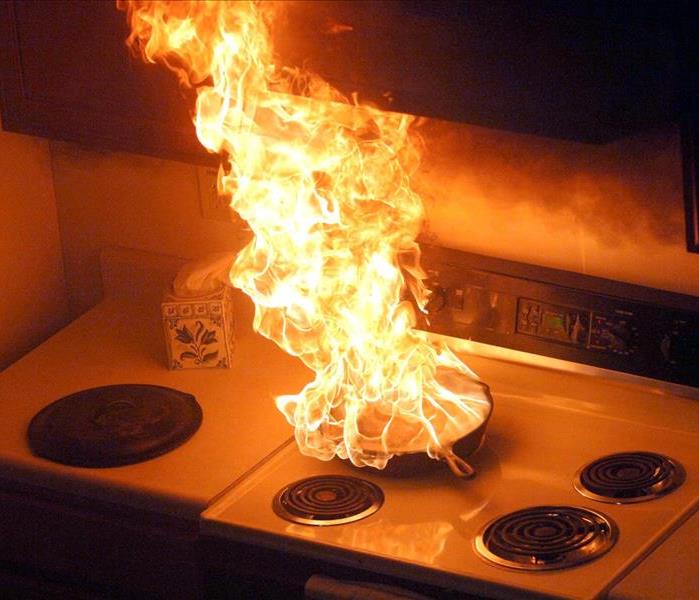 Never throw water on a grease fire!
Never throw water on a grease fire!
Stay-at-home orders and quarantines brought local restaurants to a standstill with the arrival of the 2020 coronavirus pandemic. As a result, more people than ever turned to their own kitchens to relieve stress and feed their families. The rising numbers of novice home chefs call for a reminder of basic kitchen safety.
Kitchen Safety 101
Always give your full attention to cooking. It's sometimes difficult to do when family members are both working and schooling from home, but it is essential. Forty-nine percent of home fires begin with cooking equipment, and thirty-three percent of those are from unattended equipment! A moment's distraction could end in tragedy.
A grease fire is the most common type of kitchen fire. Smoking oil is a sign that the burner is too hot! Should a fire develop, turn off the heat immediately! When frying on the stovetop, always have a lid nearby to suffocate a fire. It is also important to keep a large box of baking soda on-hand to put out a small grease fire. Never pour water on a grease fire – it will only make it worse! Every kitchen should have a fire extinguisher as a last resort.
Once you've finished cooking, always clean up any grease splatter on and around the stove. Thoroughly clean the heating elements or glass top so remnants cannot catch fire the next time the stove is in use.
Cooking is a fun and relaxing activity, but sometimes things do go wrong. Should your kitchen become damaged from a fire or water, give us a call! SERVPRO of Saline County and SERVPRO of Hot Springs are available 24/7 at 501-776-2222. Call in the professionals and we'll make it “Like it never even happened.”
We're always here to help.
Answering Common Questions About Smoke Alarms
9/16/2020 (Permalink)
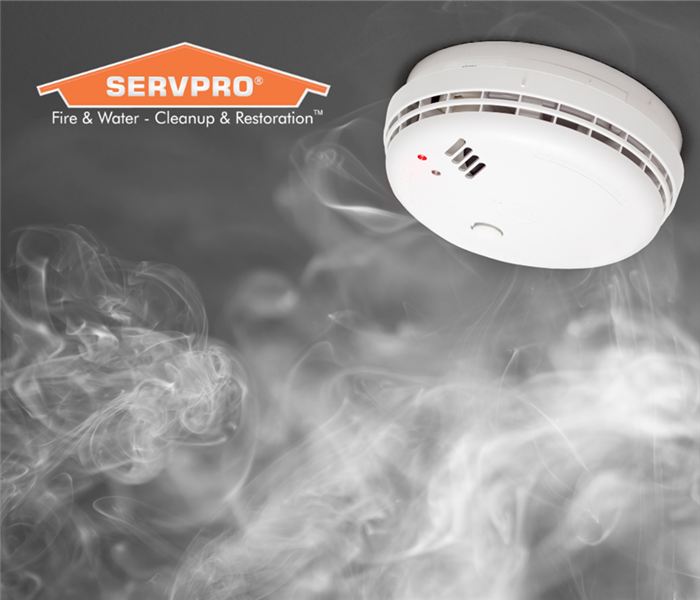 Smoke alarms can mean life or death for you and your family.
Smoke alarms can mean life or death for you and your family.
You probably know how important it is to have at least one smoke alarm in your Benton, AR home.
Yet you may have many questions about purchasing and maintaining your detectors. Below are answers to some common queries.
What Types of Smoke Detectors Should You Buy?
There are three main types of smoke detectors. They are:
- Photoelectric
- Ionization
- Dual sensor
Photoelectric and ionization alarms each sense different types of fires. Dual-sensor detectors, meanwhile, include both ionization and photoelectric sensors. Ideally, you should place either one dual-sensor alarm or both photoelectric and ionization alarms near every bedroom in your home.
Make sure that the detectors are connected. This way, they will all go off at the same time. There are also special alarms available for those who are hearing impaired.
How Much Do Smoke Alarms Cost?
A smoke alarm is a cheap way to keep your family safe. Photoelectric and ionization detectors cost as little as six dollars. Dual-sensor alarms, meanwhile, are just $24. Your local fire department may even provide free or low-cost detectors for your home.
How Do You Maintain Smoke Detectors?
You need to regularly check each smoke detector in your home to see if it is functioning properly. Ideally, you should test the alarms each month.
Alarms that are hardwired into your home or that rely on a nine-volt battery should be replaced every 10 years. You should also change the batteries at least once a year.
Some smoke detectors now come with a 10-year lithium battery. Check the manufacturer's instructions to see how often you should replace these alarms.
Of course, a smoke alarm does not always prevent home fires. It simply tells you when a blaze is occurring so you can escape your house safely. Therefore, even if you install numerous detectors, your property could still sustain fire damage. That is why local emergency restoration specialists are available to assist with the cleanup.
Firework Safety
7/1/2020 (Permalink)
The Fourth of July is America’s favorite summer day with bar-b-ques, family, and fireworks. It is a great way to celebrate America’s freedom but it’s important to be safe while lighting fireworks. According to the National Fire Protection Association (NFPA) more fires are reported on the Fourth of July than any other day of the year, with more than half of those fires being caused by fireworks. Here are a few tips to keep your home and family safe this Independence Day.
Designated Shooter-Have a responsible adult administer and light all fireworks. It is important to not mix alcohol with shooting fireworks as well. The shooter should use protective eyewear since facial and eye damage is one of the most common injuries caused by fireworks.
Have a water source ready-Hose down any sparks or stray flames from fireworks. If you have any duds, soak them with water then wait 20 minutes to ensure that they don’t have a delayed start. Be sure to wet the ground that the fireworks were lit on to prevent grass fires.
Have a designated area to light the fireworks-It is important to be sure that the area where you choose to light your fireworks is on flat, level ground. Grass, gravel, and dirt can sometimes be uneven and cause rockets to tip upon ignition and shoot in a dangerous direction. If grass is the only available option, find a piece of wood to place the fireworks on. Be aware of your surroundings. Make sure spectators are within a safe distance of the location that the fireworks will be lit. Also, be sure there are not any combustible items near the fireworks.
Have a safe Fourth of July this year. And as always, SERVPRO of Saline County and SERVPRO of Hot Springs are “here to help.”
Fire Damage To Personal Belongings
5/6/2020 (Permalink)
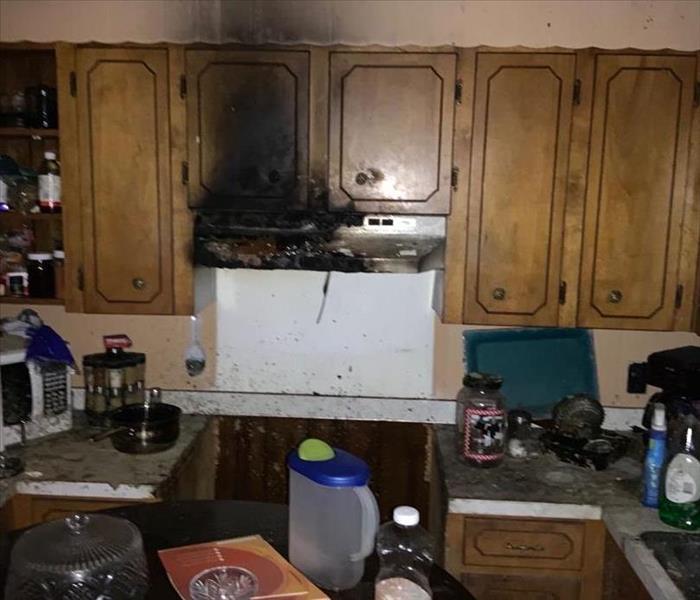
Of all the losses that can happen to a homeowner, FIRE seems to be the most personal. Even a small fire (depending on what was burned in the fire) can have far-reaching effects on the personal items in a home. You see, any kind of plastic being burned even in a small fire will leave a sticky film on everything the smoke and soot reaches. That soot, depending on what it settles on, can be corrosive and cause damage to things such as the electronics in the home. That corrosiveness, if not cleaned properly, can damage the electronics to the point they have to be replaced. Maybe the home has fine art hanging on the walls. Maybe the home is full of antiques that have been passed down through generations. Many homes are show places for collectibles. Family photos, musical instruments, and things the children/grandchildren have made do not escape the sticky soot that comes with a fire. Even the clothes in the closet that might be farthest away from the source of the fire are affected. SERVPRO of Saline County and SERVPRO of Hot Springs is qualified to help save as many of these precious items as possible. We stand ready to HELP 24/7, 365! Call us at 501-776-2222 if you need our services or have questions about what can be salvaged from a fire.
We Are The Fire Cleanup Specialist
5/1/2020 (Permalink)
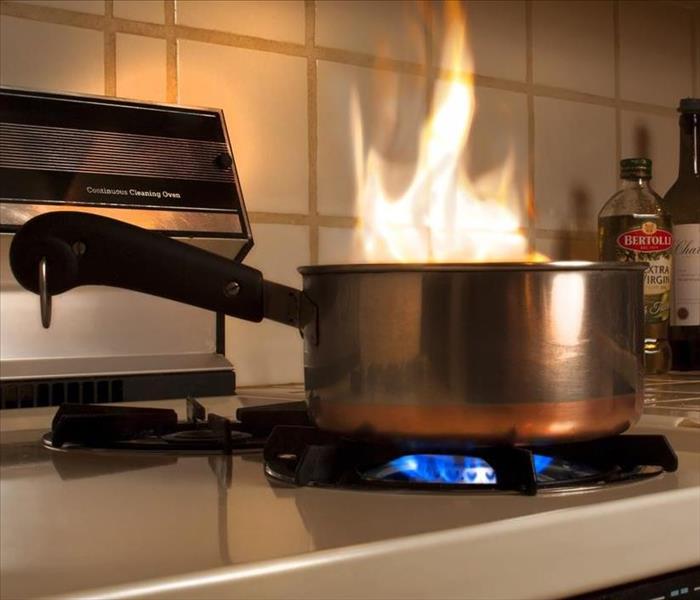
A fire in your home or business can be one of the most devastating things to happen to you ever. Most people think of complete destruction when they think of fire. In many instances that can be the case. However, did you know that even a simple flash fire on your stove can cause damage through out the entire home. Think about someone cooking something on the stove. They walk away for a few minutes to attend to something in the other room. They come back to see that whatever they were cooking has boiled over and is now on fire on top of the stove and the cabinets. The plastic spoon they were using to cook with has been engulfed in the flames and there is thick black smoke spreading throughout the house. The homeowner acts quickly and puts the fire out but now there is a mess to deal with. SERVPRO of Hot Springs is completely ready to step in and help make this situation “Like it never even happened.” In this case the kitchen will need some attention because that is where the fire happened. The black plastic spoon that created the black smoke spreading throughout the house has now left a thin sticky film as well as soot on everything as it spread. Now the other rooms in the house need cleaning as well. SERVPRO of Hot Springs has trained technicians, processes and chemicals for cleaning such an event.
Fire Detector Installation and Maintenance
7/30/2019 (Permalink)
An important way to prevent your home or business from a fire loss is by following proper protocol when it comes to installing and maintaining fire detectors.
- The same fire detectors should never be used for longer than 10 years. If you have had the same detectors for longer than this, it is important to invest in new ones right away.
- The size and layout of your home or business will determine how many detectors you need. However, as a guide, you should have at a minimum 1 detector per each level.
- Your detectors should be installed in central locations. Ceiling detectors should be placed on a flat stretch of the ceiling and wall-placed devices must be less than 12 inches from the ceiling.
- Make sure to follow your device’s instructions very carefully when installing them (especially detectors that require hardwired power). If you are uncomfortable installing on your own, there are many professionals available to install them for you.
- Test your alarms after installing by using the test button and perform power tests monthly.
- Replace non-hardwired detectors’ batteries annually.
- Lastly, thoroughly clean your detectors each year. This is important because dust and other pollutants can impede its performance.
3 Types of Smoke
7/26/2019 (Permalink)
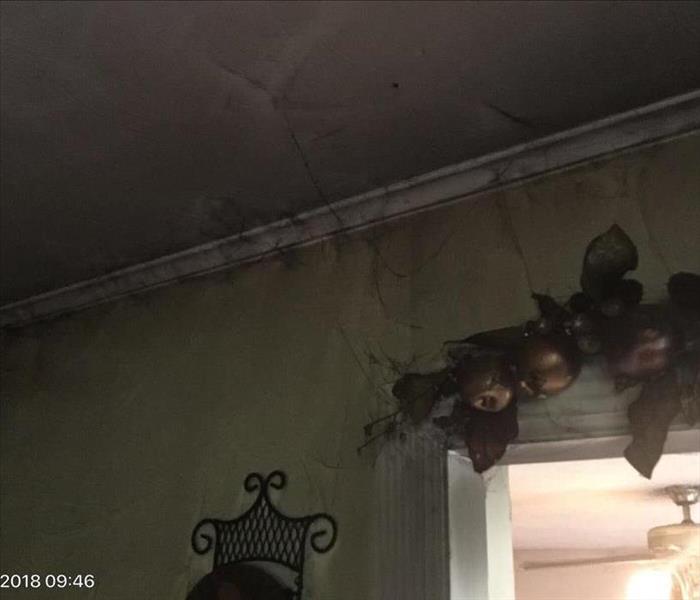 This is the result of smoke damage from a fire that happened in an adjacent room.
This is the result of smoke damage from a fire that happened in an adjacent room.
There are three different types of smoke that may affect your home or business due to a fire loss. These two different types of smoke—wet and dry—will cause different types of soot residue after a fire. This information is crucial for the remediation process. Pretesting will determine which cleaning procedures need to be used to make your home or business “Like it never even happened.” Below is more information about different types of smoke and residue:
Wet Smoke – Rubber and Plastic
- Low heat. Includes a pungent odor, sticky, smeary. Smoke webs are difficult to clean.
Dry Smoke – Paper and Wood
- Fast burning, high temperatures, heat rises therefore smoke rises.
Protein Fire Residue – Produced by evaporation of material
- Basically invisible. Discolors, paints, and varnishes. Extremely pungent odor.
Our highly trained professionals are prepared to tackle all types of smoke.
Kitchen Fire Caused by Grease
4/11/2019 (Permalink)
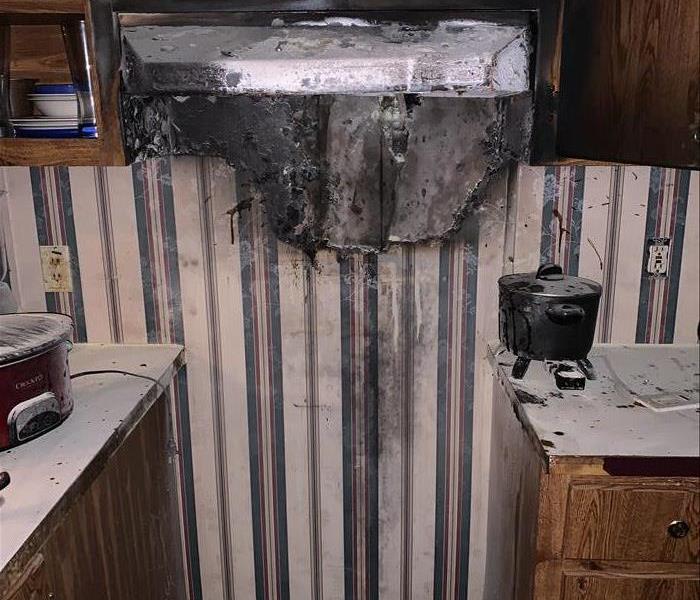 The aftermath of a grease fire.
The aftermath of a grease fire.
House fires are much more common than people think. They can happen in many ways and always suddenly. One of the most common causes is a grease fire and this photo is where the fire began in this home. The fire began on the stove and the homeowner was able to put it out with a fire extinguisher. And although the home was not a total loss, the damage was still devastating.
We understand how much your home means to you and your family, so we are ready to help. Our team has the equipment and experience to help you get your home back to normal as quickly as possible.
So, if you suffer from a fire in your Benton, Bryant or Hot Springs home, call SERVPRO of Saline County and SERVPRO or Hot Springs.
Our Fire Restoration Process
4/11/2019 (Permalink)
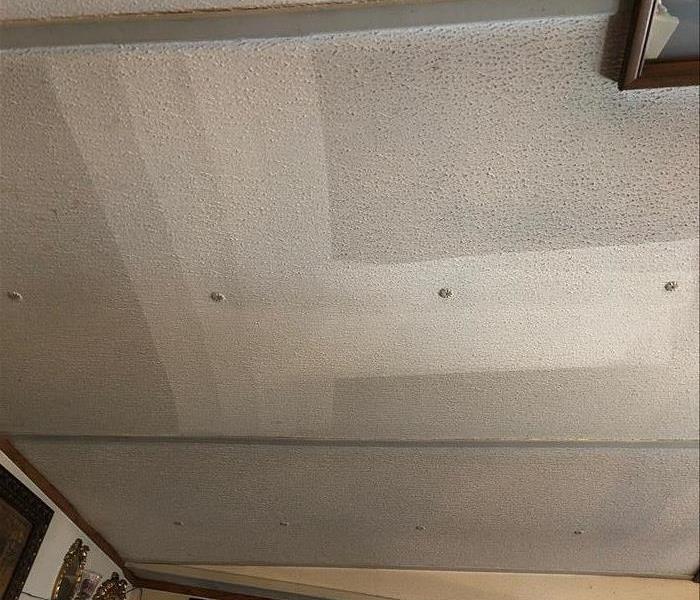 Cleaning smoke and soot from a ceiling.
Cleaning smoke and soot from a ceiling.
House fires are more common than one would think. And when they do occur the home is not always a total loss. Most fires happen in the kitchen and if put out in time the rest of the house can be saved. But that doesn’t mean that the rest of the house was not affected. Fire creates smoke and soot which can travel quickly and get on contents and the rest of the structure. SERVPRO of Saline County and SERVPRO or Hot Springs knows how important your home and belongings are. We will carefully pack up all contents and bring them back to our warehouse where we clean each item. We then get started on the structure. We wipe all walls, ceilings and floors with our specially formulated cleaning solutions. Once we have the entire structure clean and soot free, we will deodorize your home. Finally, we return all your belongings, unpack the boxes, and place the items exactly where they were before the fire. So, if you experience a devastating fire, call SERVPRO of Saline County and SERVPRO or Hot Springs. We are here to help!
 Maintaining a properly functioning smoke detector will not only keep peace and quiet in your home, but will make it much safer.
Maintaining a properly functioning smoke detector will not only keep peace and quiet in your home, but will make it much safer.

 24/7 Emergency Service
24/7 Emergency Service
